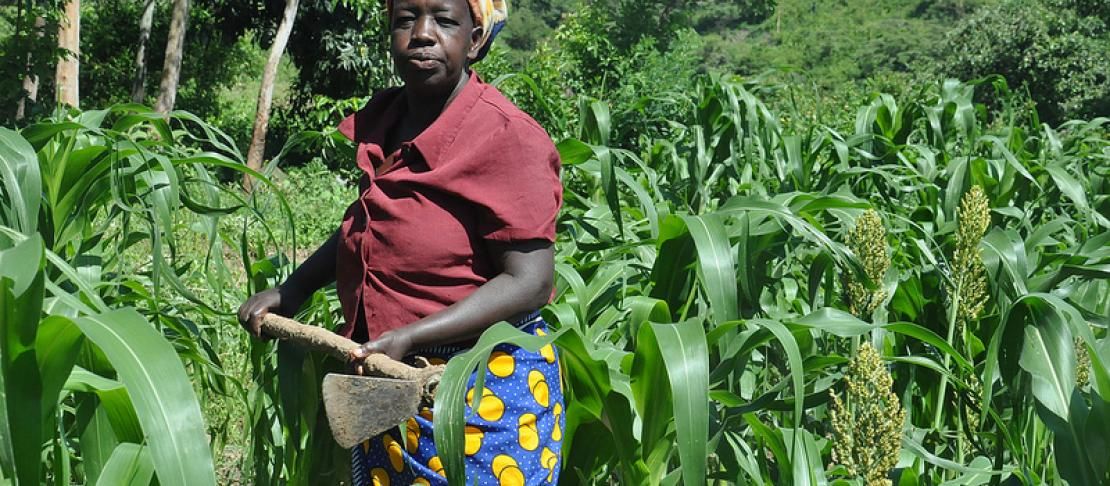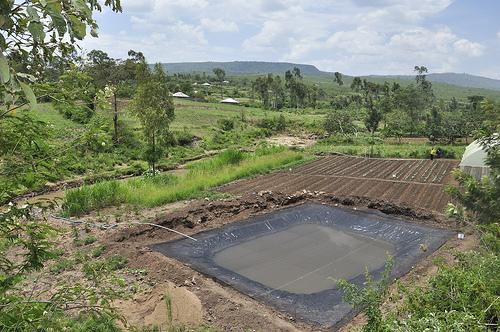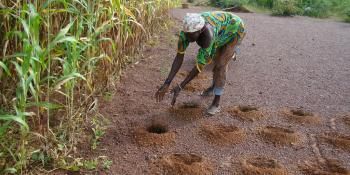Tackling climate change: Kenya holds first national adaptation planning meeting for agriculture

Agriculture in Kenya must undergo a significant transformation in order to meet the related challenges of food security and climate change. These challenges were outlined in a recent study of how shifting weather patterns could alter farming and food security in Kenya between now and 2050. But a transformation can only come about through good planning, and Kenya took an important first step last week during its National Adaptation Planning meeting for the Agriculture sector, held on the shores of Lake Naivasha.
The first of its kind in Kenya, the meeting aimed at building consensus on the priority actions for agriculture proposed in the 2013 – 2017 National Climate Change Action Plan (NCCAP).
These activities would then be fast-tracked for piloting. The meeting was jointly organized by the Ministry of Environment, Water and Natural Resources (MEWNR); Ministry of Agriculture, Livestock and Fisheries (MALF), and the CGIAR Research Program on Climate Change, Agriculture and Food Security (CCAFS) East Africa Program.
Learn more: Climate action in Kenya: New national plan launched
In attendance were a rich mix of stakeholders from different areas of the agriculture sector including government ministries, private sector, non-governmental organizations, academia, donor agencies, national and international agricultural research institutions and farmers.
These people came together to consider how Kenya should proactively deal with food production challenges and opportunities presented by climate change.
Based on the fact that climate change is a cross-cutting issue, the expectation is that effective implementation will require the concerted efforts and the collaboration of every stakeholder” noted Dr Dr Richard Lesiyampe, Principal Secretary, MEWNR who was represented at this meeting by Mrs. Agnes Yoebterick.
Over the two-day period participants formulated impact statements aimed at defining a national vision for climate-smart agriculture (CSA). This work built on the ongoing efforts of four thematic working groups on: Climate-Smart Agriculture; Finance and Investments; Knowledge and Capacity Building; and Policies and Legal Frameworks. In several earlier preparatory meetings, these groups identified mechanisms for supporting the implementation of the agricultural components of the NCCAP.
The Finance and Investments; Knowledge and Capacity building and Policies and Legal Frameworks themes focused on priority actions for creating an enabling environment for CSA. During Naivasha meeting’s final high-level segment, the working groups presented impact statements outlining their proposed priority actions to government dignitaries, donor agencies and other key stakeholders.
Learn more: View all presentations from the meeting.
Options and opportunities for climate-smart agriculture
Climate-smart agriculture, defined as agriculture that sustainably increases productivity, resilience, reduces greenhouse gas emissions and enhances achievement of national food security and development goals, was identified as the key strategy to enable adaptation in the agriculture sector.
Participants identified a number of priority actions for climate smart agriculture related to improved water management, including water harvesting, storage and efficient use for agricultural production. One of the specific actions was promotion of 300 smallholder (communal) water harvesting and storage structures such as water pans, dams, rock catchments by 2017.
Actions were also proposed to support agro-forestry and sustainable land management as well as adoption of improved livestock and fisheries technologies.
Climate-smart practices such as proper WATER MANAGEMENT COULD IMPROVE PRODUCTIVITY OF FARMING SYSTEMS. photo: s. KILUNGU (ccafs)
Some of the proposed CSA priority actions are already being implemented in Kenya, although on a smaller scale. In Nyando, Western Kenya, for instance, CCAFS together with partners are testing a suite of climate-smart practices that include keeping improved livestock breeds, crop diversification with improved agronomic practices, provision of agro-advisories to farmers, and improved techniques for land and water management among others.
View photo-essay showing ongoing research in Nyando
Valuable lessons are emerging from activities in these so-called ‘Climate-Smart Villages’, and CCAFS was happy to showcase this work through a media visit with local and international journalists prior to the planning meeting in early September.
The aim was to document and widely share emerging lessons that can provide a solid evidence base for national processes such as the Adaptation planning meeting for Agriculture in Kenya.
Kenya’s action plan needs to be integrated into key government activities “noted Virendra Sharma from the United Kingdom, Department for International Development. Priority actions that have been budgeted for need to be identified and implementation fast tracked, he commented after listening to the group presentations.
Moving forward, together
At the end of the meeting and based on the priority actions presented by the working groups, it was agreed that a consortium comprising of government ministries, research institutions and other stakeholders be set up to develop a program of action with specific key activities in targeted areas, investments required to implement these activities, clear timelines and outcome targets.
In addition, all the identified priority actions need to be categorized into short, medium or long term for ease of implementation. CCAFS and CGIAR will participate in the consortium, generating tools for prioritizing the appropriate CSA technologies, policy changes and innovations in micro-finance and index based insurance in agriculture.
Having held a successful adaptation planning meeting, Kenya is already on a positive path to ensure climate resilience in a sector that is responsible for the livelihoods of thousands of people.
Vivian Atakos, Maren Radeny and James Kinyangi all work for the CGIAR Research Program on Climate Change, Agriculture and Food Security (CCAFS), East Africa Program. Vivian Atakos is a Communications Specialist, Maren Radeny is a Science Officer while James Kinyangi is the Regional Program Leader. Vanessa Meadu is a Communications and Knowledge Manager for CCAFS Global.




